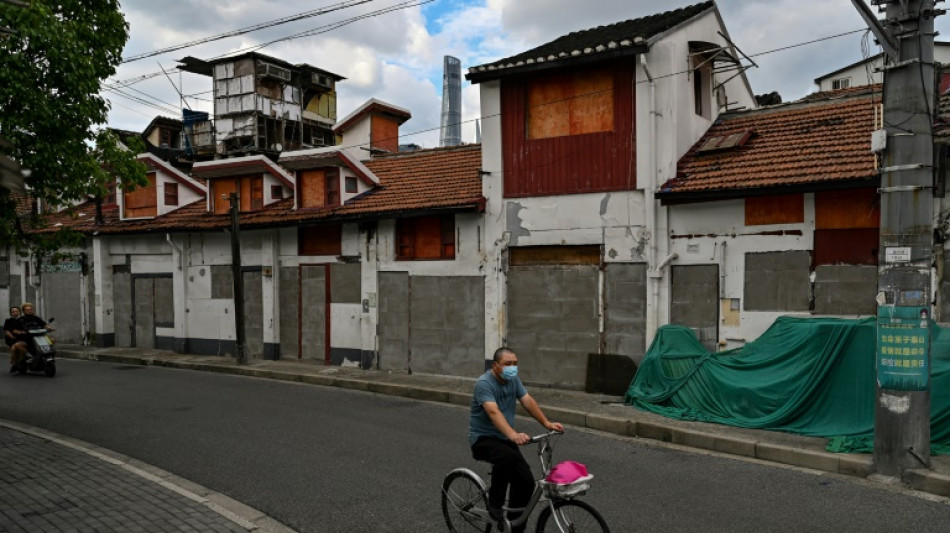
-
 Scotland spoil Italy's T20 World Cup debut with big win
Scotland spoil Italy's T20 World Cup debut with big win
-
Israeli president says 'we will overcome evil' at Bondi Beach

-
 Munsey leads Scotland to 207-4 against Italy at T20 World Cup
Munsey leads Scotland to 207-4 against Italy at T20 World Cup
-
Japan restarts world's biggest nuclear plant again

-
 Bangladesh poll rivals rally on final day of campaign
Bangladesh poll rivals rally on final day of campaign
-
Third impeachment case filed against Philippine VP Duterte

-
 Wallaby winger Nawaqanitawase heads to Japan
Wallaby winger Nawaqanitawase heads to Japan
-
Thailand's Anutin rides wave of nationalism to election victory

-
 Venezuela's Machado says ally kidnapped by armed men after his release
Venezuela's Machado says ally kidnapped by armed men after his release
-
Maye longs for do-over as record Super Bowl bid ends in misery

-
 Seahawks' Walker rushes to Super Bowl MVP honors
Seahawks' Walker rushes to Super Bowl MVP honors
-
Darnold basks in 'special journey' to Super Bowl glory

-
 Japan's Takaichi may struggle to soothe voters and markets
Japan's Takaichi may struggle to soothe voters and markets
-
Seahawks soar to Super Bowl win over Patriots

-
 'Want to go home': Indonesian crew abandoned off Africa demand wages
'Want to go home': Indonesian crew abandoned off Africa demand wages
-
Asian stocks track Wall St rally as Tokyo hits record on Takaichi win

-
 Bad Bunny celebrates Puerto Rico in joyous Super Bowl halftime show
Bad Bunny celebrates Puerto Rico in joyous Super Bowl halftime show
-
Three prominent opposition figures released in Venezuela

-
 Israeli president says 'we shall overcome this evil' at Bondi Beach
Israeli president says 'we shall overcome this evil' at Bondi Beach
-
'Flood' of disinformation ahead of Bangladesh election

-
 Arguments to begin in key US social media addiction trial
Arguments to begin in key US social media addiction trial
-
Dr. Jonathan Spages Expands Diabetes Reversal Practice Across New States, Adds Clinical Team to Meet Growing Demand

-
 Agronomics Limited Announces Net Asset Value Calculation as at 31 December 2025
Agronomics Limited Announces Net Asset Value Calculation as at 31 December 2025
-
UK-Based Vesalic Limited Emerges from Stealth with Landmark Discovery of Potential Non-CNS Driver of Motor Neuron Diseases, including ALS, and Breakthrough Therapeutic and Diagnostic Opportunities

-
 Gotterup tops Matsuyama in playoff to win Phoenix Open
Gotterup tops Matsuyama in playoff to win Phoenix Open
-
New Zealand's Christchurch mosque killer appeals conviction

-
 Leonard's 41 leads Clippers over T-Wolves, Knicks cruise
Leonard's 41 leads Clippers over T-Wolves, Knicks cruise
-
Trump says China's Xi to visit US 'toward the end of the year'

-
 Real Madrid edge Valencia to stay on Barca's tail, Atletico slump
Real Madrid edge Valencia to stay on Barca's tail, Atletico slump
-
Malinin keeps USA golden in Olympic figure skating team event

-
 Lebanon building collapse toll rises to 9: civil defence
Lebanon building collapse toll rises to 9: civil defence
-
Real Madrid keep pressure on Barca with tight win at Valencia

-
 PSG trounce Marseille to move back top of Ligue 1
PSG trounce Marseille to move back top of Ligue 1
-
Hong Kong to sentence media mogul Jimmy Lai in national security trial

-
 Lillard will try to match record with third NBA 3-Point title
Lillard will try to match record with third NBA 3-Point title
-
Vonn breaks leg as crashes out in brutal end to Olympic dream

-
 Malinin enters the fray as Japan lead USA in Olympics team skating
Malinin enters the fray as Japan lead USA in Olympics team skating
-
Thailand's Anutin readies for coalition talks after election win

-
 Fans arrive for Patriots-Seahawks Super Bowl as politics swirl
Fans arrive for Patriots-Seahawks Super Bowl as politics swirl
-
'Send Help' repeats as N.America box office champ

-
 Japan close gap on USA in Winter Olympics team skating event
Japan close gap on USA in Winter Olympics team skating event
-
Liverpool improvement not reflected in results, says Slot

-
 Japan PM Takaichi basks in election triumph
Japan PM Takaichi basks in election triumph
-
Machado's close ally released in Venezuela

-
 Dimarco helps Inter to eight-point lead in Serie A
Dimarco helps Inter to eight-point lead in Serie A
-
Man City 'needed' to beat Liverpool to keep title race alive: Silva

-
 Czech snowboarder Maderova lands shock Olympic parallel giant slalom win
Czech snowboarder Maderova lands shock Olympic parallel giant slalom win
-
Man City fight back to end Anfield hoodoo and reel in Arsenal

-
 Diaz treble helps Bayern crush Hoffenheim and go six clear
Diaz treble helps Bayern crush Hoffenheim and go six clear
-
US astronaut to take her 3-year-old's cuddly rabbit into space


Demolition looms for historic Shanghai neighbourhood
Bricked-up doorways, crumbling facades and a small group of defiant locals: one of Shanghai's oldest neighbourhoods is barely clinging to life as the city presses ahead with demolition and redevelopment plans.
Laoximen or "old West Gate" -- named for its position in Shanghai's 16th-century defensive walls -- was once the city's cultural centre.
Built around the site of a Confucian temple, the mostly two- and three-storey buildings of stone and wood are an anachronism at the heart of Shanghai's gleaming commercial district.
Thousands of residents -- a mix of old Shanghai families and migrant workers drawn to the low rent -- were ordered to leave their homes at the end of 2017, though some have clung to the ageing buildings for years after the deadline.
Yang, who declined to give his full name, is one of the last residents who has resisted compensation from the government and held onto his home in Laoximen, a damp labyrinth of long corridors stacked with old furniture and household appliances.
"This piece of land was bought by my grandfather," Yang, whose family has lived in the area since before the Communist Party took power in 1949, told AFP.
Most of his neighbours have agreed to leave, but Yang is holding out for what he says is compensation that would match "the value of the house".
- Compensation -
According to the local government, Laoximen residents can receive as much as 20,000 yuan ($2,962) per square metre, with bonus payments for moving out early.
But the average pre-owned apartment in Shanghai currently costs more than 55,000 yuan per square metre, according to property company Anjuke.
The final demolition was apparently delayed by the pandemic, but diggers have resumed their work after Shanghai emerged from lockdown earlier this year.
Where locals once dined at popular restaurants, large red-and-white signs on the walls urge cooperation with redevelopment plans.
"Open, fair and just: promote the renovation of the old city," one reads.
Doors and windows have been sealed with cement blocks in the winding streets, pockmarked with piles of old chairs, boards and doors.
A short walk from Shanghai's swanky Bund riverside, Laoximen is one of thousands of ageing neighbourhoods in China where residents have been relocated and the land has been taken back by the government in the name of redevelopment and progress.
Many of the homes in the neighbourhood predated modern building standards, and lack heating or central plumbing.
Residents are typically offered new apartments or a sum of money to give up their homes, though some redevelopment projects have caused public anger and violent confrontations in parts of the country.
Replacing Laoximen's once densely packed alleyways with larger, higher-end developments could also help the city achieve its goal of capping its population at 25 million by 2035.
Authorities announced the goal in 2017 as part of a campaign to curb "big city diseases" including congestion and housing shortages.
- 'Public interest' -
Wu Weigang, a retiree who grew up in the area with his extended family, has especially fond memories of celebrating Chinese New Year in Laoximen as a child.
"Everyone set off fireworks and hung up rabbit-shaped lanterns during the lantern festival," he said.
Wu, who now lives two hours away in a temporary apartment in Qingpu district, occasionally returns to Laoximen to revisit his old haunts and check in with neighbours.
Most of the buildings in Laoximen were built in the 20th century in the "shikumen" style of rowhouses arranged along branching lanes.
Antique dealers have been waiting outside family homes to buy up heirlooms in recent months, as families clear out their last belongings.
When night falls, the yellow glow of the streetlights envelops the enclave's near-empty alleys, while the Oriental Pearl Tower glows in the distance.
Shanghai authorities say the area will be redeveloped to meet "the needs of public interest."
Wu hopes some of the old neighborhood's charm will survive the redevelopment intact.
"They told me my home was being preserved," Wu told AFP. "If it weren't here, I wouldn't come to see it, otherwise I would be so sad."
M.Thompson--AMWN

